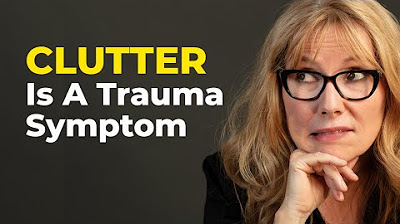Black Mental Health Matters | Phillip J. Roundtree | TedxWilmington 2018
Summary
TLDRIn this powerful speech, the speaker highlights the intersection of Black identity and mental health, discussing personal experiences with depression, anxiety, and trauma. He reflects on societal expectations, the pressure to suppress emotions, and how mental health issues manifest differently in Black men. Sharing stories of family loss, institutional racism, and the journey toward healing, the speaker emphasizes the importance of addressing mental health within the Black community. He advocates for shifting from survival to thriving and calls for greater understanding and support for Black mental health issues.
Takeaways
- 😀 The speaker is often perceived based on physical traits like being black, bearded, and strong, resembling famous figures like James Harden or 50 Cent.
- 😔 Despite outward appearances, the speaker battles with depression, anxiety, and suicidal thoughts, which are not often recognized or acknowledged.
- 💡 Black mental health is often overlooked in the larger conversation about mental health, where stereotypes about race and mental illness persist.
- 🧠 Trauma plays a significant role in black mental health, including historical trauma (slavery, Jim Crow) and modern-day events (police brutality, violence).
- 😢 The speaker shares personal stories of trauma, including witnessing his mother's nervous breakdown and the death of his brother from drug use.
- 💥 The speaker highlights how black men’s mental health often manifests in anger and rage rather than traditional symptoms like prolonged sadness.
- 👮♂️ A minor incident with a cup of juice led to the speaker being arrested, charged, and jailed, demonstrating how unresolved trauma and anger can escalate situations.
- 📚 Therapy and medication have been crucial in the speaker’s journey to mental wellness, helping him move from survival to thriving.
- ✊ The speaker urges the black community to seek help, reject the stigma around mental health, and embrace wellness and healing.
- 💭 The speech is a call to broaden the understanding of mental health beyond the stereotypical images, including people of color who are often excluded from the narrative.
Q & A
What common perceptions does the speaker mention people have about him?
-The speaker mentions that people commonly perceive him as black, bearded, strong, and resembling NBA player James Harden, hip-hop star Donald Glover (Childish Gambino), and Curtis Jackson (50 Cent).
What does the speaker emphasize people don't recognize about him?
-The speaker emphasizes that people don't recognize his struggles with depression, anxiety, and being suicidal for 15 years, despite his external appearance.
How does the speaker describe the typical American view of mental health?
-The speaker describes the typical American view of mental health as focusing on homeless individuals, white celebrities who die by suicide, and white mass murderers, rather than acknowledging people like him, a Black man with a family and education.
What does the speaker mean by 'Black mental health'?
-The speaker defines 'Black mental health' as the individual and collective experiences shaped by trauma that affect the wellness of the Black community, including historical trauma like slavery, Jim Crow laws, and present-day violence.
What are the three personal traumatic experiences the speaker shares?
-The speaker shares three personal traumatic experiences: his mother's nervous breakdown when he was in eighth grade, the death of his brother when he was 17, and an incident in college where he was arrested and jailed after being accused of stealing juice.
How did the speaker cope with the loss of his brother?
-The speaker coped by crying and following cultural practices from hip-hop, such as getting a 'rest in peace' tattoo, though he later realized that these actions did not alleviate the pain of losing his brother.
How does the speaker describe the manifestation of depression and anxiety in Black men?
-The speaker explains that depression and anxiety in Black men often manifest as anger and rage rather than the stereotypical image of someone lying in bed for days.
What lesson did the speaker learn from his psychology professor, Dr. Campbell?
-Dr. Campbell taught the speaker that in life, you either change to get something or to keep something, a lesson that became the speaker's mantra in his journey toward mental wellness.
What has helped the speaker in his journey toward wellness?
-The speaker has found wellness through a combination of medication that helped eliminate his suicidal thoughts and regular therapy sessions, which he attends weekly.
What message does the speaker give to Black and non-Black audiences regarding mental health?
-To Black audiences, the speaker encourages them to seek help, thrive, and not just survive. To non-Black audiences, he asks them to reconsider their perceptions of Black individuals, recognizing their potential mental health struggles and the resilience required to succeed.
Outlines

このセクションは有料ユーザー限定です。 アクセスするには、アップグレードをお願いします。
今すぐアップグレードMindmap

このセクションは有料ユーザー限定です。 アクセスするには、アップグレードをお願いします。
今すぐアップグレードKeywords

このセクションは有料ユーザー限定です。 アクセスするには、アップグレードをお願いします。
今すぐアップグレードHighlights

このセクションは有料ユーザー限定です。 アクセスするには、アップグレードをお願いします。
今すぐアップグレードTranscripts

このセクションは有料ユーザー限定です。 アクセスするには、アップグレードをお願いします。
今すぐアップグレード関連動画をさらに表示

Black Mental Health Matters | Phillip J. Roundtree | TEDxWilmington

The power of honest introductions | Sarain Fox | TEDxToronto

How Far Have We Come? Black Teens vs Grandparents | Middle Ground

Vulnerability is your superpower | Sanisha Wynter | TEDxUniversityofBristol

Our streets: queer & Black bodies in movement and protest

Heal Chaos and Overwhelm: DECLUTTER Every Part of Your Life
5.0 / 5 (0 votes)
